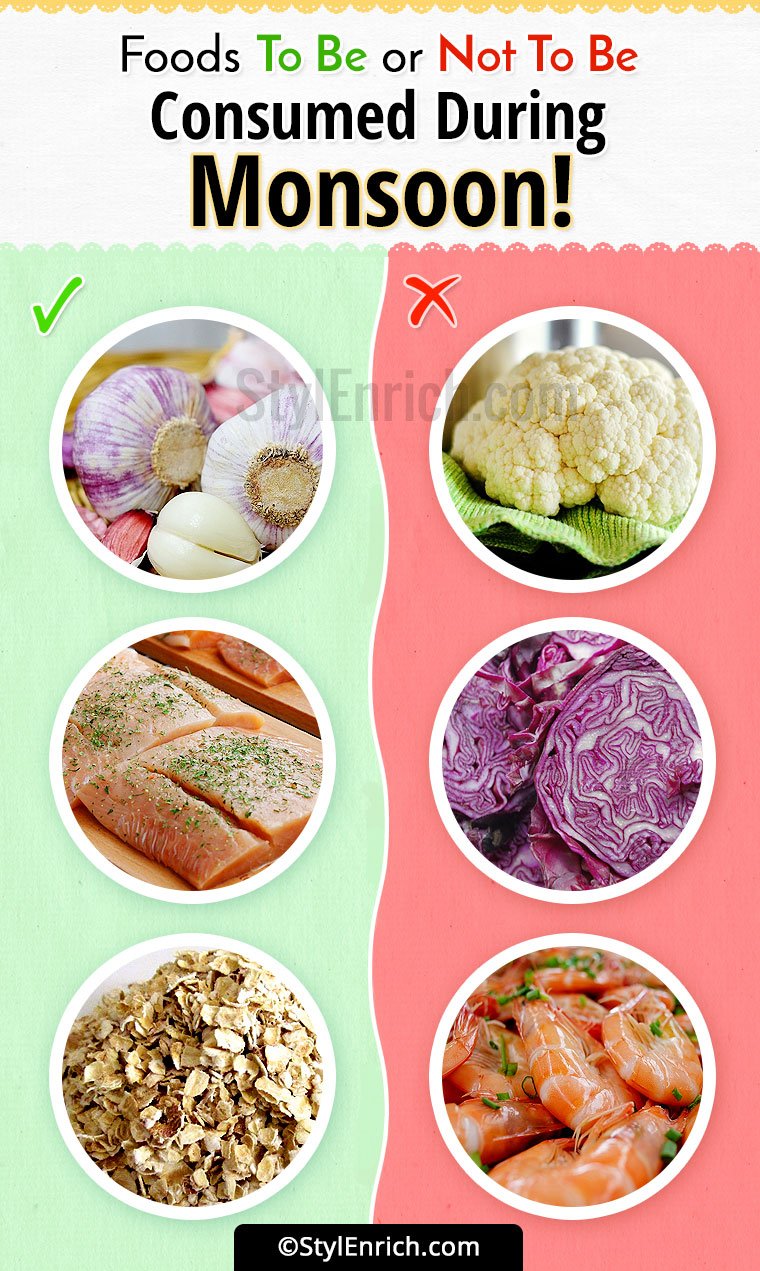We welcome monsoon season with joy and happiness after the scorching heat and sweat of summer. Monsoon brings happiness on face and along with it brings certain health risks. Our body is more vulnerable to such health issues during rainy season. Monsoon reduces the immunity power of our body as the humidity level rises during this season. Due to this human body are constantly affected by the allergies, infection and digestion problem. We should take proper care of our body during this season and special attention should be given to the best food for rainy season we are in taking.
Why Do We Get Diseases In Monsoon?
The major problem during this season is that the digestive system of our body becomes weak and therefore we should avoid taking oily foods and street foods. These foods are much exposed to the outside temperature and causes infection in stomach. Also, the water gets contaminated most of the time which is the main reason behind diseases and epidemic breakouts.
We should take care of nutrition & best food for rainy season. So, the diseases such as dengue, malaria, conjunctivitis, viral fever can be avoided. It is advisable to keep a sharp eye on what to eat and what should be avoided during rainy season.
Below are some of the best food for rainy season which could be helpful in maintaining our food chart during rainy season:
Best Food For Rainy Season
1. Fruits and Vegetables
Fruits should be taken as they help us in restoring the energy. Fresh fruits are highly recommended to be consumed in the monsoon season. Best suggested fruits are mangoes, apples, pomegranates, pears etc.
It is also advisable to consume fresh fruit in this season as having any juice from outside can result in health problems. Water is considered to be highly contaminated in the monsoon and this may be the cause of several health problems. Therefore, cut fruits are the best.
As far as vegetables are concerned, avoid eating sage, spinach and leafy vegetables. The primarily reason being that these are likely to be infested with pests and you may end up in stomach trouble. However, you can opt for the seasonal vegetables like beans, double beans, drumsticks, lady’ finger etc.
Soups are the best food for rainy season for health. However, ensure that you prepare them at home itself. Do not opt for soups outside or even the packed ones.
2. Intake Less Salt
Monsoon is the best season to have fried foods and we all love to have tea or coffee along with pakoras, fried foods, potato chips, tikki’s etc. However, do keep your health in mind as well. All these food contain high levels of salt in them which is extremely dangerous for high blood pressure people.
Salty foods increase the blood pressure levels and you may suffer from heart diseases. Also, there is a chance that you gain weight by eating oily and fatty food.
Control the level of salt in your food and stay healthy to enjoy the monsoon.
3. Consume Dry Food
As discussed earlier, watery food can cause health related risks as it often gets contaminated. Eating dry food is advisable during this time.
Eat foods which are dry in nature as the watery foods may cause our body to swell. It also results in bloating as digestion is mostly impacted during rainy season.
4. Eat Healthy
Undoubtedly, monsoon is a tempting season and your craving for food increases manifold. However, you should make the right choices in this season to stay healthy and fit.
Foods like Oats, Barley and Brown rice are the best food for rainy season. They keep you full all the time and also add up the nutrition levels in the body. Plenty of corn is available during this season and you can have them anywhere anytime.
The best thing is to have home cooked food rather than eating outside as it improves your immunity and there are less chances of any disease. Also, it is mostly observed that people suffer from stomach related ailments during this season. Therefore, avoid outside food as far as possible.
5. Garlic
A dash of garlic is also recommended in order to increase the body immunity. Garlic also has anti0inflammatory properties and any form of swelling in the body can be controlled by adding garlic to your diet regularly.
Garlic is hot in nature and therefore prevents any form of cold and cough in this season. It improves the immunity system and keeps you healthy all the time.
You can also chew 1-2 garlic cloves daily to stay healthy or add raw garlic cloves in rice and consume them as the first thing in your meals. Add crushed garlic to your soups and salads.
6. Drink Boiled Water
Water can be very infectious and a breeding place for germs during monsoon. Boiled and purified water should be taken as they are free from germs and bacteria.
Water needs special attention in this season and it is one of the main sources to spread diseases and epidemics. Be very careful with water. Do not store water in bottles for a long period. Drink only boiled water free of germs. You should boil water properly for 15-20 minutes before drinking it.
Also, more important that you need to intake water every 2-3 hours to keep yourself hydrated all the time.
7. Avoid Spicy And Oily Food
Thinking of eating pizza or a burger? Do you love the street food? Think once again before consuming them in monsoon. It is very tempting to have all these food in rainy season but think about your face, skin and hair before having them.
Spicy and oily foods should be avoided as they might lead to pimples on face or skin allergies during rainy season. If you are prone to allergies then this food should never be on your plate.
8. Consume Fish
Fish like sardines, salmons, mackerel and rohu should be taken at this time. These fishes are a rich source of fish oil and omega-3 which are very useful for health and heart.
It increases the immunity system as well and promotes well being for individual. It is a myth that fish should not be taken in rainy season as they suffer from some disease. The fact is fish lay eggs in rainy season and this makes them less tasty. However, they retain the nutritional value.
9. Tender Coconut
Tender coconut is one of the rich sources of vitamins and essential minerals. Also, it is very safe to consume it during the monsoon. This is the only water which will not get contaminated.
However, do remember to drink it fresh. Do not store it in some container as it effectively reduces. Fresh tender coconut will keep you hydrated and enrich your body with the essential nutrients.
Drink tender coconut daily and see the difference in your hair, skin and health. It will not only keep you healthy from inside but also keeps you glowing from outside.
Do’/Don’ts In Monsoon
- Vegetables like cabbage, cauliflower are avoided during monsoon as the dampness present in these vegetables can attract germs which can be harmful to us. Also, all the vegetables are washed properly before cooking.
- Any kind of fresh juice which are kept in open for a long time and are exposed to the atmosphere should be highly avoided.
- All the street foods and foods from the roadside vendors are most vulnerable to the diseases and should not be consumed.
- Drink plenty of water in this season as you need to hydrate your body. Monsoon is a season when you do not feel thirsty mostly as perspiration levels are low. However, remember the key rule of drinking 8 glasses of water and follow it as a routine.
- Try to avoid heavy meals as much as possible. Usually, it is difficult to digest food in rainy season, therefore opt for light meals. You can eat something at an interval of 2-3 hours to provide your body with the essential nutrients.
- Stay away from prawns, crabs and sea food as they could be harmful to the health.
- No cauliflower and cabbages in monsoon as this will contain pests and may pose a serious health hazard.
- Refrain having canned food and juices in rainy season as it is a breeding place for bacteria.
Tips and Tricks
Monsoon is not just about food. You need to take care of your health and fitness as well. Here are some tips to stay fit and healthy in the rainy season.
- First and foremost, continue with your regular exercise. The cloudy weather compels you to be lazy and have a good sleep all the time. However, do not be lazy and hit the gym or do some form of physical exercise. It is important to sweat out and eliminate the harmful bacteria.
- Personal hygiene is extremely important. Take special care of your feet, hair, skin and face. Also, do not skip baths as it is a regular practice among most of the people.
- Eat a protein rich diet all the time to stay fit and healthy. Eggs are a wonder food during the rainy season.
Conclusion
Monsoon is definitely a great season. The only thing is that you need to make the right choices in terms of food which is very important. You need to eat right, stay fit and enjoy the rain showers. However, in case you fall sick then it is always advisable to see a doctor immediately.
Hope you have found this article useful. In case of any suggestion or feedback please share the same in the comments section below.


















